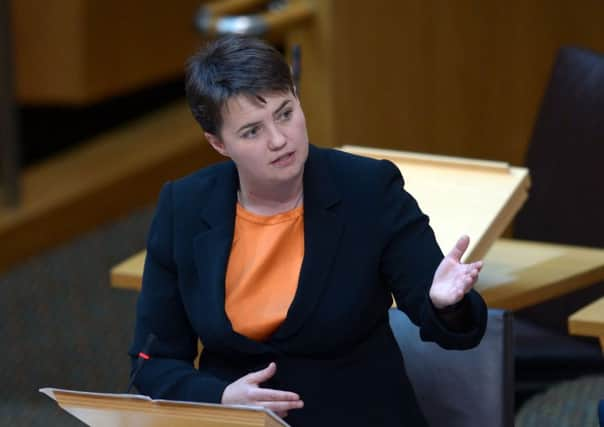Leaders: Ruth Davidson | BBC’s funding model


AN SNP triumphant; the Scottish Liberal Democrats scythed to near oblivion; UKIP with no body of support in Scotland and Scottish Labour turned in on itself in an existential soul-searching for a new leader and purpose.
While we can expect the SNP to, quietly, make a continued and reasoned case for independence, who will continue to push pro-Union arguments? It would be easy to assume after voters’ rejection of independence in the referendum that it is “yesterday’s battle”. But the debate is still current.
Advertisement
Hide AdAdvertisement
Hide AdThis is the background to the speech Scottish Conservative leader Ruth Davidson is set to make in London this evening. Her key signal to those south of the Border is that independence remains very much a live issue and there needs to be careful management of Scotland to ensure conditions for another independence referendum do not emerge. Supporters of the union, she will say, “can’t fall into the trap of thinking it’ll all turn out OK on its own. It won’t.”
With pressing issues such as Greece and the Eurozone, immigration and the battle over benefit cuts, it is all too easy for Prime Minister David Cameron and his Cabinet colleagues to allow the future of Scotland to slip down the priority list.
It may be argued that with the finer details of the second reading of the Scotland Bill and the many specifics of tax and spending powers, nothing could be further from the truth. But there is more to the cause of unionism than fine detail on debt and welfare consequentials. The case for the union is, as it has historically always been, about more than legislative minutiae. It is a case that, against a ferocious independence campaign, was supported by two million Scots. For that reason alone it should not be allowed to slip down the priority list.
This is a highly important role that Davidson and the Scottish Tories are now set to play. She has already made progress in ‘detoxifying the Tory brand’ and preparing the party for a forthcoming clash over the SNP’s plans to use extra powers to pursue higher tax and spending. But her immediate mission is to seize the opportunity not only to speak for those unconvinced about independence but also to challenge her own party leader, David Cameron, not to lose focus on the wider case in defence of the union. She will say there needs to be continued “vigilance” to keep the union intact. And “more needs to be done” by pro-UK politicians to ensure the benefits of the UK are understood.
A strong voice for Scotland on all sides is important. While other parties are preoccupied with internal concerns, Ms Davidson is now in pole position to advance a pro-union argument, and in doing so, to assure the majority of No voters in the referendum that their concerns are not forgotten.
The BBC’s funding model is broken
The BBC is the world’s oldest national broadcasting organisation and the largest by number of employees, with more than 20,000 staff. But is the licence fee funding method still fit for purpose? Its Director-General, Lord Hall, says he believes the licence fee (currently £145.50) has still “got ten years of life in it”.
Another ten years may well be what many within the Corporation wish to think. But there is a growing swell of opinion that much now needs to change – and quickly.
The chief weakness of Lord Hall’s assertion lies in the growing technological challenges to licence fee funding. It is now possible to access much of the BBC’s output without paying the fee, and this technological challenge is growing ever more widespread and sophisticated. How many would be left paying the fee in 2025?
Advertisement
Hide AdAdvertisement
Hide AdAnd many feel that the fee, likened to a television poll tax, has financed a culture of reckless spending and indulgence.
This income has not been wisely spent. The BBC’s programme and spending priorities have been challenged, licence fee payers bristle at too much being spent on head office staff salaries, perks and gizmos while serious innovative work plays second fiddle to airhead celebs and presenters on crazy salaries such as Gary Lineker’s reputed £2 million.
Others sense that the licence fee has bred a metropolitan – and self-indulgent – view of the world. With the rapid development of other media attractions, the funding model is broken and its justification threadbare. Reform cannot wait for Lord Hall’s self-serving ten years.